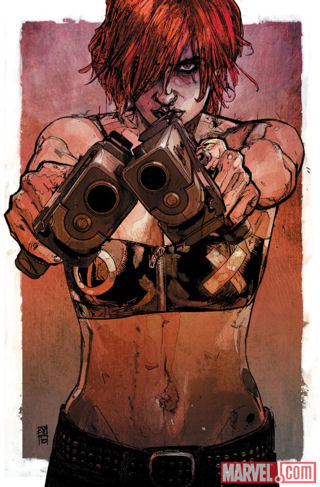Scarlet
#1
writer: Brian Michael Bendis
artist: Alex Maleev
Relax.
I come to praise Bendis, not to bury him.
So for
those of you just tuning in to comics in the past three
or four years, you might wonder a bit about the reputation
of Brian Michael Bendis. Yes, he's a solid superhero comics
writer, and done a fine job working with Joe Quesada in
masterminding the direction of the Marvel Universe.
But
like any writer of mainstream superhero comics, Bendis can
be good and Bendis can be mediocre because he's working
within the constraints of a pre-set, marketable universe.
What got him there, however, was showing us a skewed vision
of reality that was always intriguing and sometimes a little
scary because, hey, this could happen.
Even when he first teamed with Alex Maleev
on their memorable Daredevil run that made his bones
along with Ultimate Spider-Man, Bendis had a grit
that getting into more brightly clad heroes kind of sanded
down. That's not a knock; that's evolution of a writer,
perhaps, and a not mysterious willingness to actually make
money in a medium he loves.
With
Scarlet, the Bendis that made everyone sit up and
take notice is back. I'm sure he'd argue he never really
went away, but it's been a while since one of his books
has been something out of the ordinary, fun, sure, but just
another one in the stack.
Scarlet, however, is a project that
comes from passion, and it shows. It shows in every panel
of Maleev's detailed panels depicting life on the streets
of Portland, Oregon.
You can feel those streets; you can almost
hear those people. Heck, Maleev's art is so textured, you
might just be able to smell them.
That smell, by the way, might just be revolution.
The sounds, however, are those of people hustling along
just trying to get through their day. In their midst is
one ordinary young woman who got pushed too far and will
draw us into her anger. Maybe it's righteous, maybe it's
not, but Bendis writes her so realistically you can't help
but want to see how this plays out.
The book opens with Scarlet killing a cop.
She could be justified; at least she's going to try to convince
us. Though written in a voice reminiscent of a David Mamet
play, this first issue feels a lot like Shakespeare's Richard
III, with Scarlet immediately turning to us to explain
her motivation and her plan. Like Richard, she also knows
we'll be perfectly complicit.
Again, that's not to say she's wrong. Bendis
won't let us make any easy decisions on that, and Maleev
matches that with his art. Nobody's over-developed, clearly
handsome or clearly ugly (thus bad); they're just people
about to lurch into something way over their heads with
the best intentions.
Here's a little tip, stage actresses: buy
this first issue and practice the monologue that runs through
it. It's going to make one heck of an audition piece. As
for Bendis and Maleev, they've already got the part.
|






